Deck 3: Linear Equations, Graphs, and Functions
Question
Question
Question
Question
Question
Question
Question
Question
Question
Question
Question
Question
Question
Question
Question
Question
Question
Question
Question
Question
Question
Question
Question
Question
Question
Question
Question
Question
Question
Question
Question
Question
Question
Question
Question
Question
Question
Question
Question
Question
Question
Question
Question
Question
Question
Question
Question
Question
Question
Question
Question
Question
Question
Question
Question
Question
Question
Question
Question
Question
Question
Question
Question
Question
Question
Question
Question
Question
Question
Question
Question
Question
Question
Question
Question
Question
Question
Question
Question
Question

Unlock Deck
Sign up to unlock the cards in this deck!
Unlock Deck
Unlock Deck
1/347
Play
Full screen (f)
Deck 3: Linear Equations, Graphs, and Functions
1
The graph shows sales in thousands of dollars for 1989 and 1990. Use it to answer the question
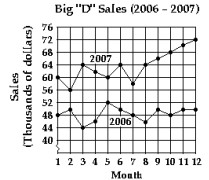
-If the ordered pair represents a point on the graph, what does represent? What does represent?
A) represents the month; represents the sales in thousands of dollars.
B) represents the month; represents the sales in thousands of dollars.
C) represents the year 2006; y represents the sales in thousands of dollars
D) represents the year 2006; y represents the year 2007 .

-If the ordered pair represents a point on the graph, what does represent? What does represent?
A) represents the month; represents the sales in thousands of dollars.
B) represents the month; represents the sales in thousands of dollars.
C) represents the year 2006; y represents the sales in thousands of dollars
D) represents the year 2006; y represents the year 2007 .
represents the month; represents the sales in thousands of dollars.
2
The graph shows sales in thousands of dollars for 1989 and 1990. Use it to answer the question

-Estimate the sales in June 2006.
A) about thousand
B) about thousand
C) about thousand
D) about thousand

-Estimate the sales in June 2006.
A) about thousand
B) about thousand
C) about thousand
D) about thousand
about thousand
3
The graph shows sales in thousands of dollars for 1989 and 1990. Use it to answer the question

-Write an ordered pair that gives approximately the sales in June 2006.
A) (June, 50)
B)
C)
D)

-Write an ordered pair that gives approximately the sales in June 2006.
A) (June, 50)
B)
C)
D)
4
The graph shows sales in thousands of dollars for 1989 and 1990. Use it to answer the question

-What does the ordered pair for 2006 mean in the context of this graph?

-What does the ordered pair for 2006 mean in the context of this graph?

Unlock Deck
Unlock for access to all 347 flashcards in this deck.
Unlock Deck
k this deck
5
The graph shows sales in thousands of dollars for 1989 and 1990. Use it to answer the question

-Which month in 2006 had the lowest sales?
A) Month 8
B) Month 3
C) Month 2
D) Month 6

-Which month in 2006 had the lowest sales?
A) Month 8
B) Month 3
C) Month 2
D) Month 6

Unlock Deck
Unlock for access to all 347 flashcards in this deck.
Unlock Deck
k this deck
6
The graph shows sales in thousands of dollars for 1989 and 1990. Use it to answer the question

-Which month in 2007 had the highest sales?
A) Month 5
B) Month 12
C) Month 3
D) Month 6

-Which month in 2007 had the highest sales?
A) Month 5
B) Month 12
C) Month 3
D) Month 6

Unlock Deck
Unlock for access to all 347 flashcards in this deck.
Unlock Deck
k this deck
7
The graph shows sales in thousands of dollars for 1989 and 1990. Use it to answer the question

-What month in 2006 had the highest sales?
A) Month 2
B) Month 12
C) Month 3
D) Month 5

-What month in 2006 had the highest sales?
A) Month 2
B) Month 12
C) Month 3
D) Month 5

Unlock Deck
Unlock for access to all 347 flashcards in this deck.
Unlock Deck
k this deck
8
The graph shows sales in thousands of dollars for 1989 and 1990. Use it to answer the question

-What month in 2007 had the lowest sales?
A) Month 2
B) Month 5
C) Month 12
D) Month 3

-What month in 2007 had the lowest sales?
A) Month 2
B) Month 5
C) Month 12
D) Month 3

Unlock Deck
Unlock for access to all 347 flashcards in this deck.
Unlock Deck
k this deck
9
Name the quadrant, if any, in which the point is located.
-
A) III
B) I
C) II
D) None
-
A) III
B) I
C) II
D) None

Unlock Deck
Unlock for access to all 347 flashcards in this deck.
Unlock Deck
k this deck
10
Name the quadrant, if any, in which the point is located.
-
A) I
B) None
C) II
D) III
-
A) I
B) None
C) II
D) III

Unlock Deck
Unlock for access to all 347 flashcards in this deck.
Unlock Deck
k this deck
11
Name the quadrant, if any, in which the point is located.
-
A) III
B) II
C) None
D) IV
-
A) III
B) II
C) None
D) IV

Unlock Deck
Unlock for access to all 347 flashcards in this deck.
Unlock Deck
k this deck
12
Name the quadrant, if any, in which the point is located.
-
A) IV
B) III
C) I
D) II
-
A) IV
B) III
C) I
D) II

Unlock Deck
Unlock for access to all 347 flashcards in this deck.
Unlock Deck
k this deck
13
Name the quadrant, if any, in which the point is located.
-
A) II
B) IV
C) None
D) III
-
A) II
B) IV
C) None
D) III

Unlock Deck
Unlock for access to all 347 flashcards in this deck.
Unlock Deck
k this deck
14
Name the quadrant, if any, in which the point is located.
-
A) II
B) IV
C) None
D) III
-
A) II
B) IV
C) None
D) III

Unlock Deck
Unlock for access to all 347 flashcards in this deck.
Unlock Deck
k this deck
15
Plot the point on the rectangular coordinate system provided. Write the corresponding letter as your answer.
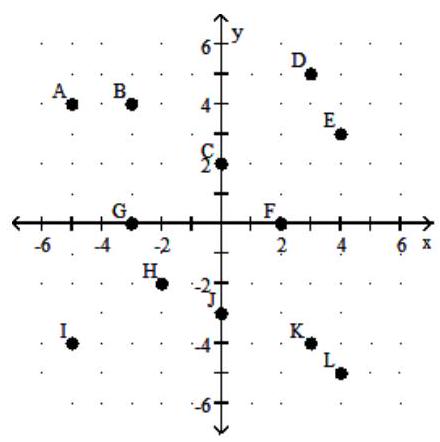
-
A)
B)
C)
D) B

-
A)
B)
C)
D) B

Unlock Deck
Unlock for access to all 347 flashcards in this deck.
Unlock Deck
k this deck
16
Plot the point on the rectangular coordinate system provided. Write the corresponding letter as your answer.

-
A) I
B) A
C)
D)

-
A) I
B) A
C)
D)

Unlock Deck
Unlock for access to all 347 flashcards in this deck.
Unlock Deck
k this deck
17
Plot the point on the rectangular coordinate system provided. Write the corresponding letter as your answer.

-
A)
B)
C)
D)

-
A)
B)
C)
D)

Unlock Deck
Unlock for access to all 347 flashcards in this deck.
Unlock Deck
k this deck
18
Plot the point on the rectangular coordinate system provided. Write the corresponding letter as your answer.

-
A)
B)
C) J
D) G

-
A)
B)
C) J
D) G

Unlock Deck
Unlock for access to all 347 flashcards in this deck.
Unlock Deck
k this deck
19
Plot the point on the rectangular coordinate system provided. Write the corresponding letter as your answer.

-
A) D
B)
C)
D) I

-
A) D
B)
C)
D) I

Unlock Deck
Unlock for access to all 347 flashcards in this deck.
Unlock Deck
k this deck
20
Plot the point on the rectangular coordinate system provided. Write the corresponding letter as your answer.

-
A) C
B)
C)
D)

-
A) C
B)
C)
D)

Unlock Deck
Unlock for access to all 347 flashcards in this deck.
Unlock Deck
k this deck
21
Plot the point on the rectangular coordinate system provided. Write the corresponding letter as your answer.

-
A) C
B) I
C)
D) J

-
A) C
B) I
C)
D) J

Unlock Deck
Unlock for access to all 347 flashcards in this deck.
Unlock Deck
k this deck
22
Plot the point on the rectangular coordinate system provided. Write the corresponding letter as your answer.

-
A) C
B) F
C)
D) B

-
A) C
B) F
C)
D) B

Unlock Deck
Unlock for access to all 347 flashcards in this deck.
Unlock Deck
k this deck
23
Plot the point on the rectangular coordinate system provided. Write the corresponding letter as your answer.

-
A)
B)
C)
D)

-
A)
B)
C)
D)

Unlock Deck
Unlock for access to all 347 flashcards in this deck.
Unlock Deck
k this deck
24
Complete the table for the equation.
-
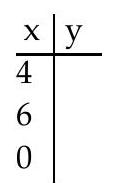
A)
B)
C)
D)
-

A)
B)
C)
D)

Unlock Deck
Unlock for access to all 347 flashcards in this deck.
Unlock Deck
k this deck
25
Complete the table for the equation.
-

A)
B)
C)
D)
-

A)
B)
C)
D)

Unlock Deck
Unlock for access to all 347 flashcards in this deck.
Unlock Deck
k this deck
26
Complete the table for the equation.
-

A)
B)
C)
D)
-

A)
B)
C)
D)

Unlock Deck
Unlock for access to all 347 flashcards in this deck.
Unlock Deck
k this deck
27
Complete the table for the equation.
-

A)
B)
C)
D)
-

A)
B)
C)
D)

Unlock Deck
Unlock for access to all 347 flashcards in this deck.
Unlock Deck
k this deck
28
Complete the table for the equation.
-

A)
B)
C)
D)
-

A)
B)
C)
D)

Unlock Deck
Unlock for access to all 347 flashcards in this deck.
Unlock Deck
k this deck
29
Complete the table for the equation.
-

A)
B)
C)
D)
-

A)
B)
C)
D)

Unlock Deck
Unlock for access to all 347 flashcards in this deck.
Unlock Deck
k this deck
30
Complete the table for the equation.
-

A)
B)
C)
D)
-

A)
B)
C)
D)

Unlock Deck
Unlock for access to all 347 flashcards in this deck.
Unlock Deck
k this deck
31
Graph the equation by determining the missing values needed to plot the ordered pairs.
-
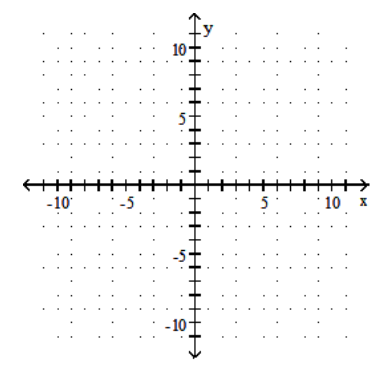
A)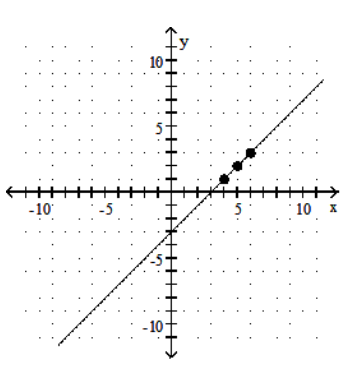
B)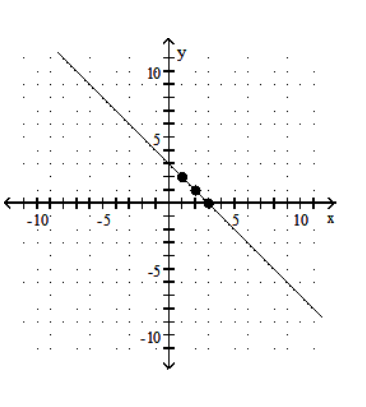
C)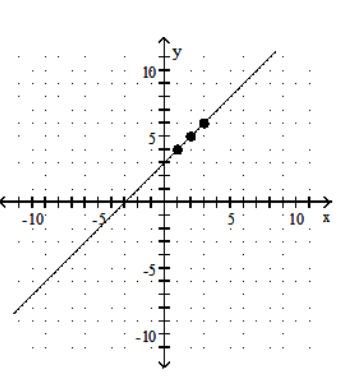
D)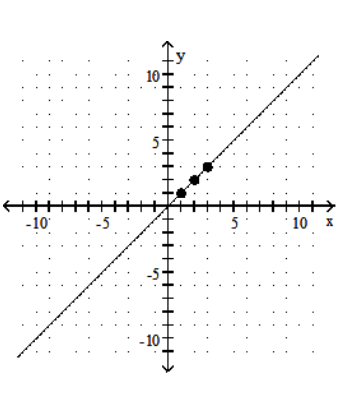
-

A)

B)

C)

D)


Unlock Deck
Unlock for access to all 347 flashcards in this deck.
Unlock Deck
k this deck
32
Graph the equation by determining the missing values needed to plot the ordered pairs.
-
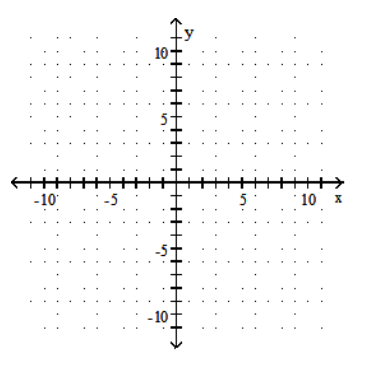
A)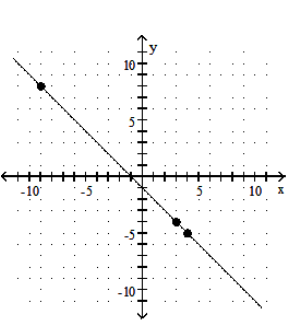
B)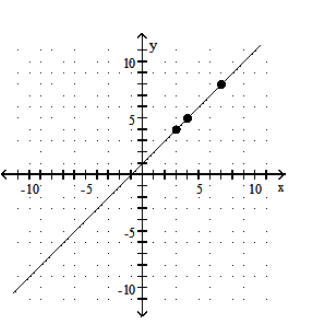
C)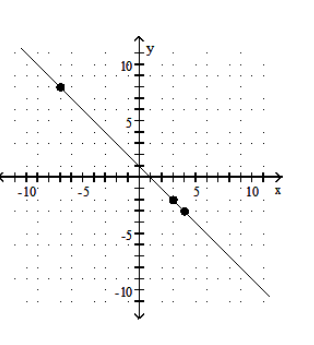
D)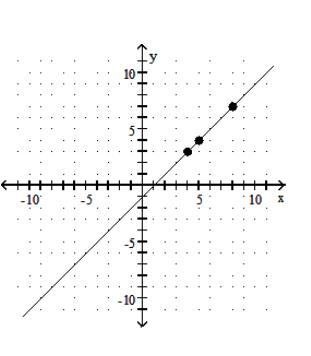
-

A)

B)

C)

D)


Unlock Deck
Unlock for access to all 347 flashcards in this deck.
Unlock Deck
k this deck
33
Graph the equation by determining the missing values needed to plot the ordered pairs.
-
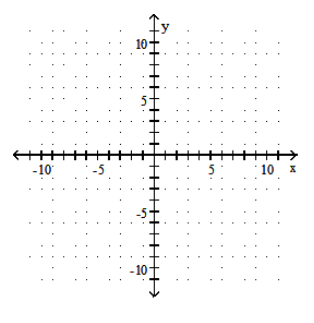
A)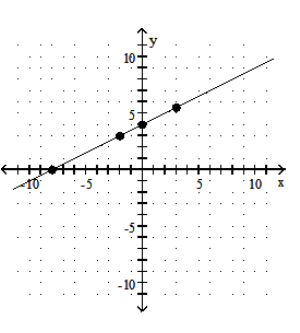
B)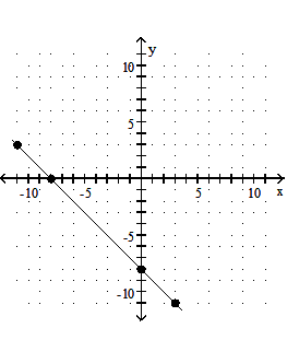
C)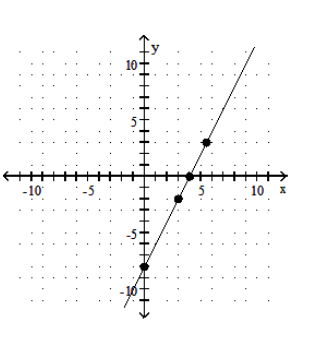
D)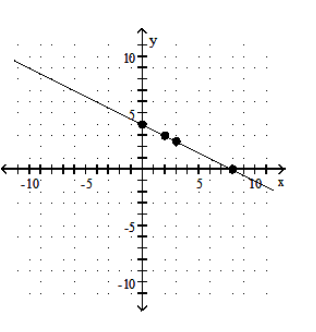
-

A)

B)

C)

D)


Unlock Deck
Unlock for access to all 347 flashcards in this deck.
Unlock Deck
k this deck
34
Graph the equation by determining the missing values needed to plot the ordered pairs.
-
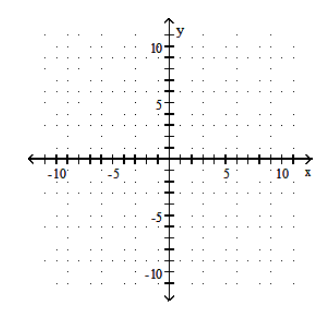
A)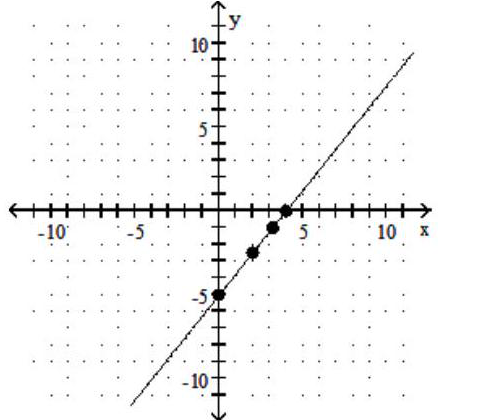
B)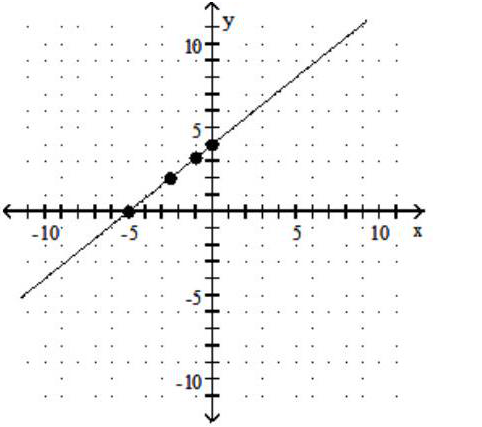
C)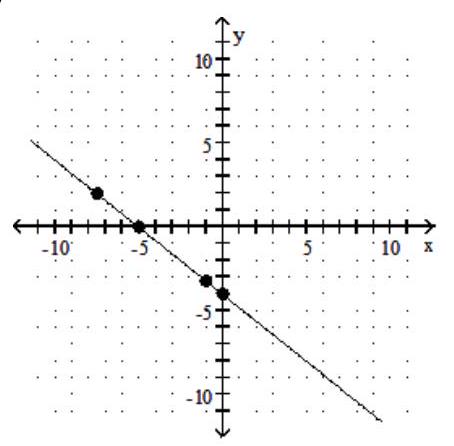
D)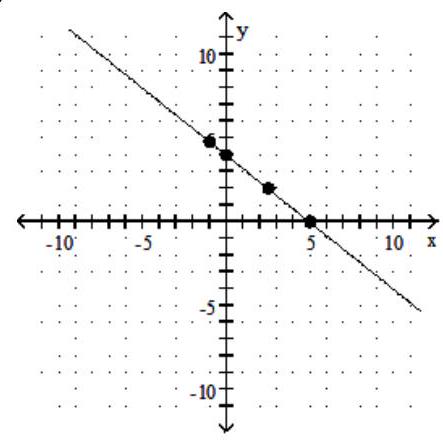
-

A)

B)

C)

D)


Unlock Deck
Unlock for access to all 347 flashcards in this deck.
Unlock Deck
k this deck
35
Find the - and -intercepts. Then graph the equation.
-
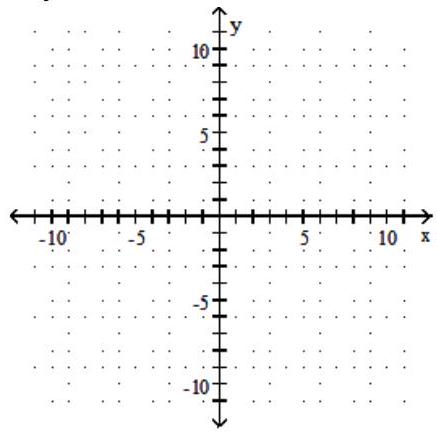
A)
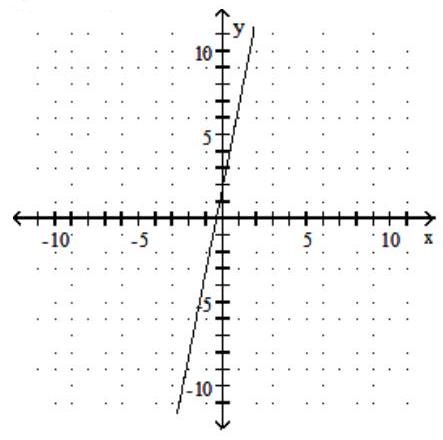
B)
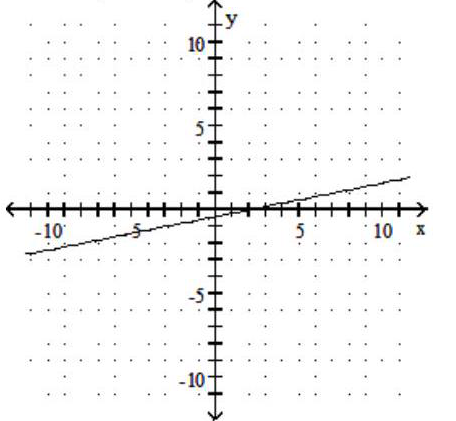
C)
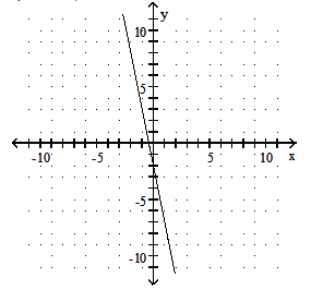
D)
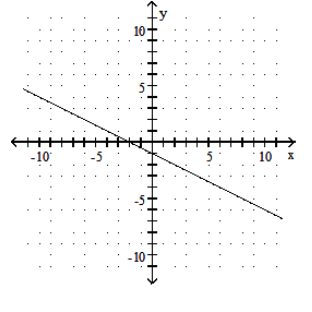
-

A)

B)

C)

D)


Unlock Deck
Unlock for access to all 347 flashcards in this deck.
Unlock Deck
k this deck
36
Find the - and -intercepts. Then graph the equation.
-
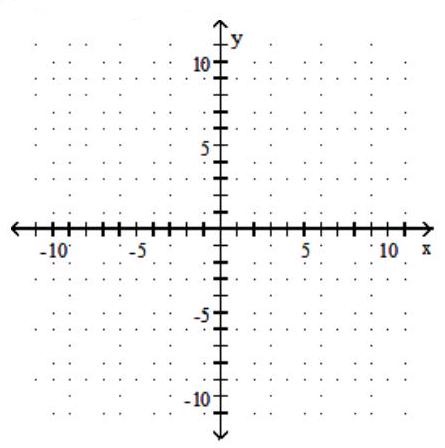
A)
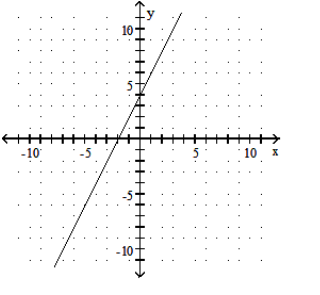
B)
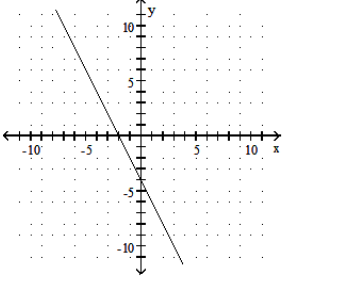
C)
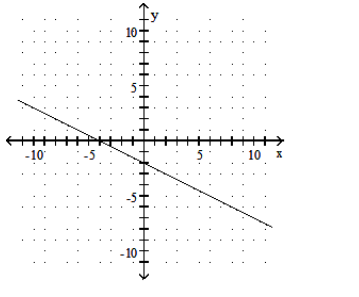
D)
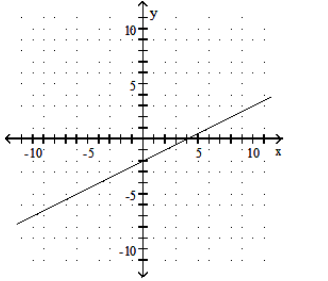
-

A)

B)

C)

D)


Unlock Deck
Unlock for access to all 347 flashcards in this deck.
Unlock Deck
k this deck
37
Find the - and -intercepts. Then graph the equation.
-
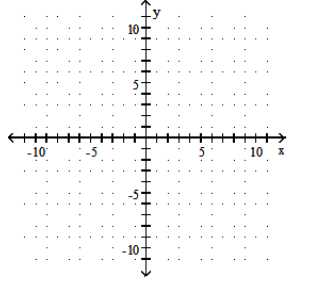
A) None;
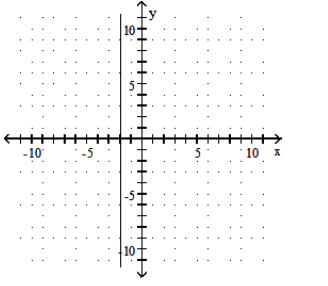
B) ; none
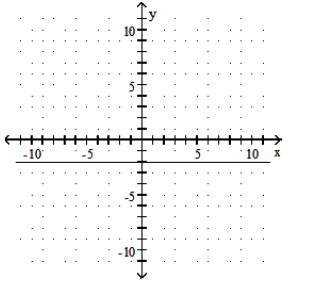
C) None;
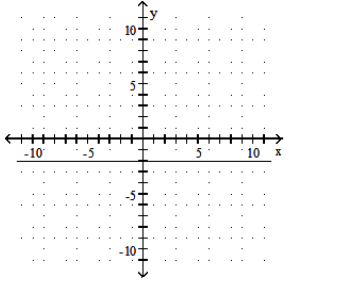
D) ; none
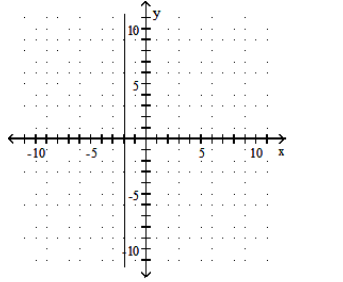
-

A) None;

B) ; none

C) None;

D) ; none


Unlock Deck
Unlock for access to all 347 flashcards in this deck.
Unlock Deck
k this deck
38
Find the - and -intercepts. Then graph the equation.
-
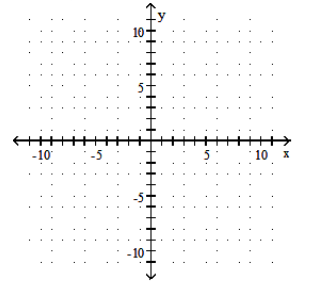
A)
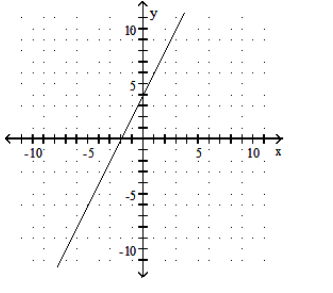
B)
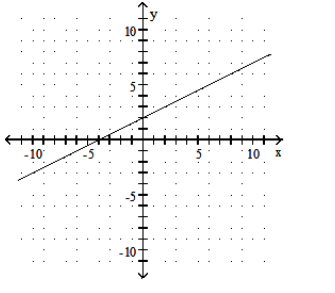
C)
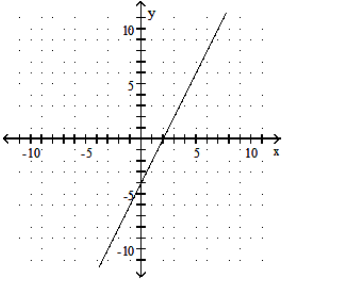
D)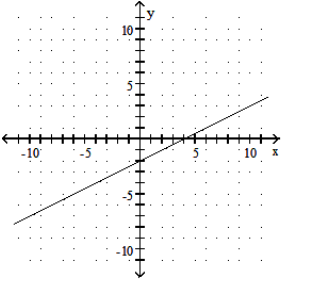
-

A)

B)

C)

D)


Unlock Deck
Unlock for access to all 347 flashcards in this deck.
Unlock Deck
k this deck
39
Find the - and -intercepts. Then graph the equation.
-
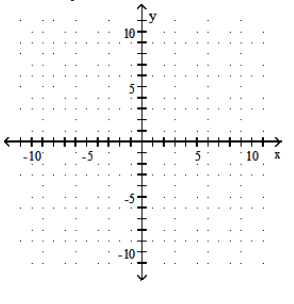
A)
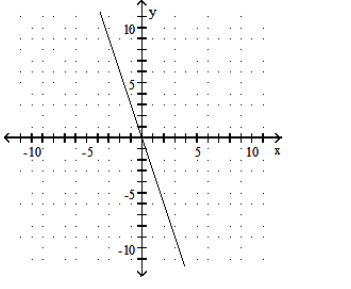
B)
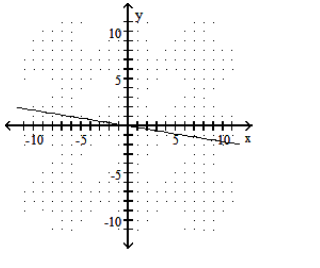
C)
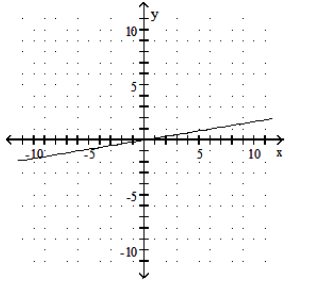
D)
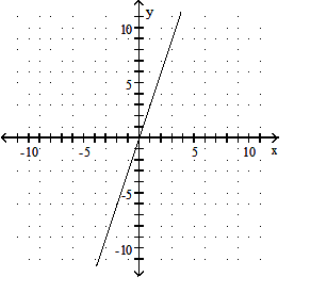
-

A)

B)

C)

D)


Unlock Deck
Unlock for access to all 347 flashcards in this deck.
Unlock Deck
k this deck
40
Find the - and -intercepts. Then graph the equation.
-
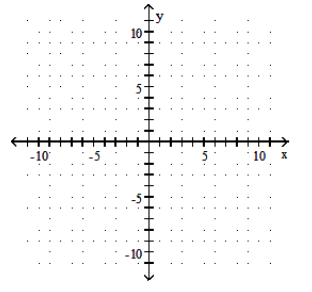
A)
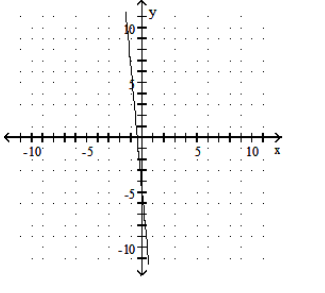
B)
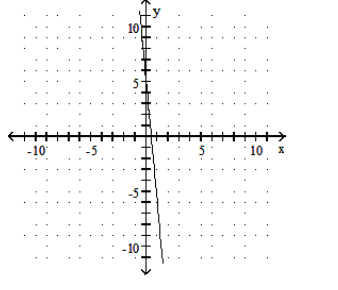
C)
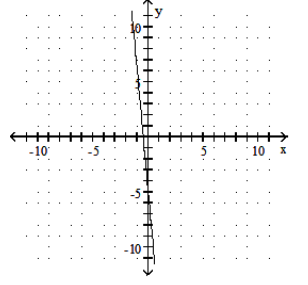
D)
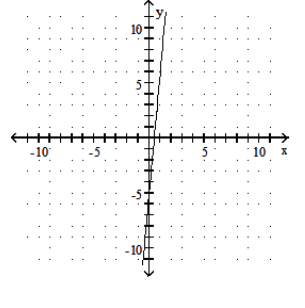
-

A)

B)

C)

D)


Unlock Deck
Unlock for access to all 347 flashcards in this deck.
Unlock Deck
k this deck
41
Find the - and -intercepts. Then graph the equation.
-
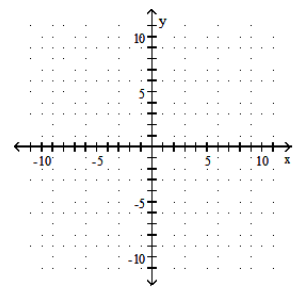
A)
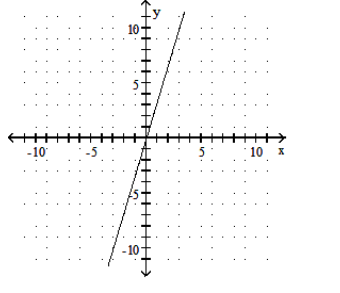
B)
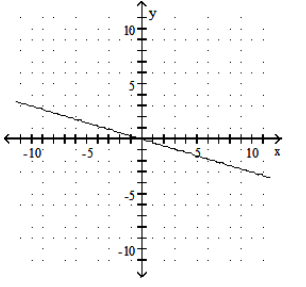
C)

D)
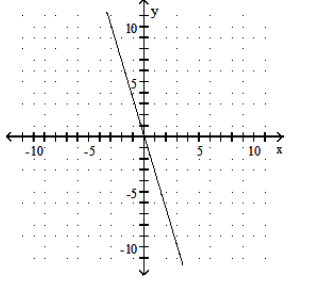
-

A)

B)

C)

D)


Unlock Deck
Unlock for access to all 347 flashcards in this deck.
Unlock Deck
k this deck
42
Find the - and -intercepts. Then graph the equation.
-
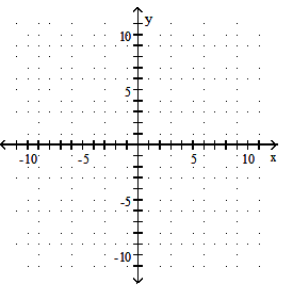
A) ; none
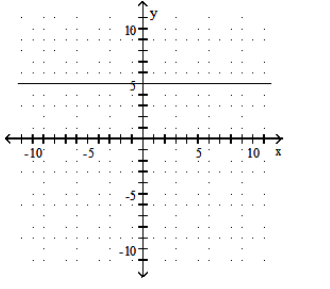
B) None ;
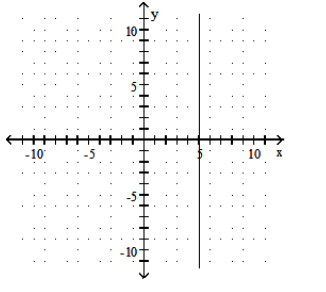
C) None ;
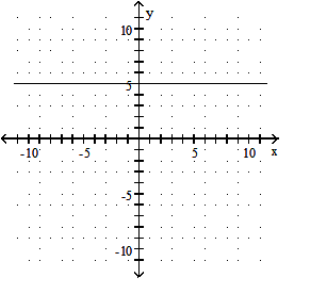
D) ; none
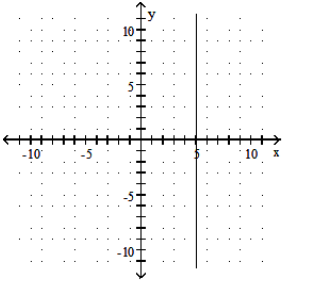
-

A) ; none

B) None ;

C) None ;

D) ; none


Unlock Deck
Unlock for access to all 347 flashcards in this deck.
Unlock Deck
k this deck
43
Find the midpoint of the segment with the given endpoints.
- and
A)
B)
C)
D)
- and
A)
B)
C)
D)

Unlock Deck
Unlock for access to all 347 flashcards in this deck.
Unlock Deck
k this deck
44
Find the midpoint of the segment with the given endpoints.
- and
A)
B)
C)
D)
- and
A)
B)
C)
D)

Unlock Deck
Unlock for access to all 347 flashcards in this deck.
Unlock Deck
k this deck
45
Find the midpoint of the segment with the given endpoints.
- and
A)
B)
C)
D)
- and
A)
B)
C)
D)

Unlock Deck
Unlock for access to all 347 flashcards in this deck.
Unlock Deck
k this deck
46
Find the midpoint of the segment with the given endpoints.
- and
A)
B)
C)
D)
- and
A)
B)
C)
D)

Unlock Deck
Unlock for access to all 347 flashcards in this deck.
Unlock Deck
k this deck
47
Find the midpoint of the segment with the given endpoints.
- and
A)
B)
C)
D)
- and
A)
B)
C)
D)

Unlock Deck
Unlock for access to all 347 flashcards in this deck.
Unlock Deck
k this deck
48
Find the midpoint of the segment with the given endpoints.
- and
A)
B)
C)
D)
- and
A)
B)
C)
D)

Unlock Deck
Unlock for access to all 347 flashcards in this deck.
Unlock Deck
k this deck
49
Suppose that segment has the given coordinates for one endpoint and for its midpoint . Find the coordinates of the other endpoint .
- and
A)
B)
C)
D)
- and
A)
B)
C)
D)

Unlock Deck
Unlock for access to all 347 flashcards in this deck.
Unlock Deck
k this deck
50
Suppose that segment has the given coordinates for one endpoint and for its midpoint . Find the coordinates of the other endpoint .
- and
A)
B)
C)
D)
- and
A)
B)
C)
D)

Unlock Deck
Unlock for access to all 347 flashcards in this deck.
Unlock Deck
k this deck
51
Suppose that segment has the given coordinates for one endpoint and for its midpoint . Find the coordinates of the other endpoint .
- and
A)
B)
C)
D)
- and
A)
B)
C)
D)

Unlock Deck
Unlock for access to all 347 flashcards in this deck.
Unlock Deck
k this deck
52
Suppose that segment has the given coordinates for one endpoint and for its midpoint . Find the coordinates of the other endpoint .
- and
A)
B)
C)
D)
- and
A)
B)
C)
D)

Unlock Deck
Unlock for access to all 347 flashcards in this deck.
Unlock Deck
k this deck
53
Suppose that segment has the given coordinates for one endpoint and for its midpoint . Find the coordinates of the other endpoint .
- and
A)
B)
C)
D)
- and
A)
B)
C)
D)

Unlock Deck
Unlock for access to all 347 flashcards in this deck.
Unlock Deck
k this deck
54
Suppose that segment has the given coordinates for one endpoint and for its midpoint . Find the coordinates of the other endpoint .
- and
A)
B)
C)
D)
- and
A)
B)
C)
D)

Unlock Deck
Unlock for access to all 347 flashcards in this deck.
Unlock Deck
k this deck
55
Solve the problem.
-The graphing calculator screen shows the graph of one of the equations below. Which equation is it?
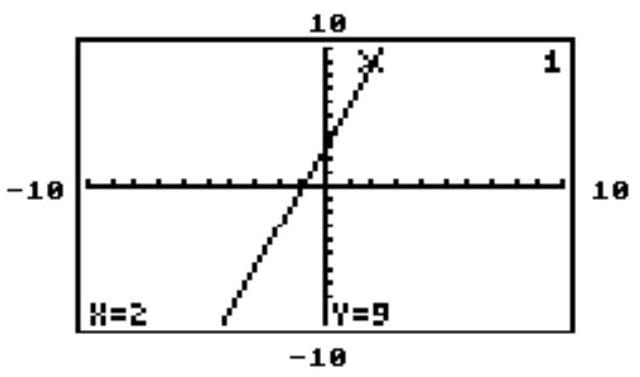
A)
B)
C)
D)
-The graphing calculator screen shows the graph of one of the equations below. Which equation is it?

A)
B)
C)
D)

Unlock Deck
Unlock for access to all 347 flashcards in this deck.
Unlock Deck
k this deck
56
Solve the problem.
-The graphing calculator screen shows the graph of one of the equations below. Which equation is it?
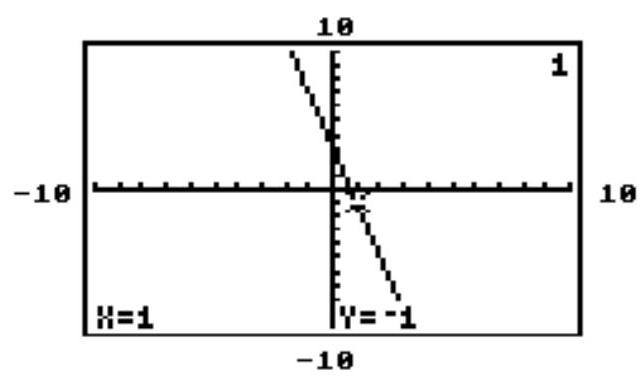
A)
B)
C)
D)
-The graphing calculator screen shows the graph of one of the equations below. Which equation is it?

A)
B)
C)
D)

Unlock Deck
Unlock for access to all 347 flashcards in this deck.
Unlock Deck
k this deck
57
Solve the problem.
-The graphing calculator screen shows the graph of one of the equations below. Which equation is it?
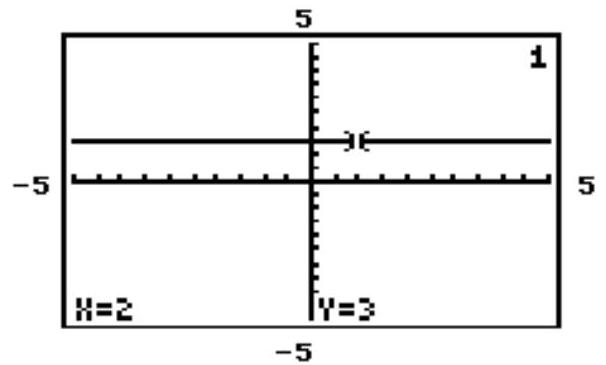
A)
B)
C)
D)
-The graphing calculator screen shows the graph of one of the equations below. Which equation is it?

A)
B)
C)
D)

Unlock Deck
Unlock for access to all 347 flashcards in this deck.
Unlock Deck
k this deck
58
Solve the problem.
-The graphing calculator screens show the graph of one of the equations below. Which equation is it?

A)
B)
C)
D)
-The graphing calculator screens show the graph of one of the equations below. Which equation is it?

A)
B)
C)
D)

Unlock Deck
Unlock for access to all 347 flashcards in this deck.
Unlock Deck
k this deck
59
Solve the problem.
-The graphing calculator screens show the graph of one of the equations below. Which equation is it?

A)
B)
C)
D)
-The graphing calculator screens show the graph of one of the equations below. Which equation is it?

A)
B)
C)
D)

Unlock Deck
Unlock for access to all 347 flashcards in this deck.
Unlock Deck
k this deck
60
Solve the problem.
-The table of ordered pairs was generated by a graphing calculator with a table feature. Which equation corresponds to this table of values?
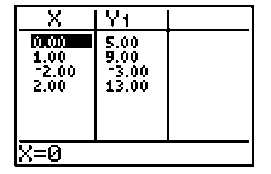
A)
B)
C)
D)
-The table of ordered pairs was generated by a graphing calculator with a table feature. Which equation corresponds to this table of values?

A)
B)
C)
D)

Unlock Deck
Unlock for access to all 347 flashcards in this deck.
Unlock Deck
k this deck
61
Solve the problem.
-The table of ordered pairs was generated by a graphing calculator with a table feature. Which equation corresponds to this table of values?
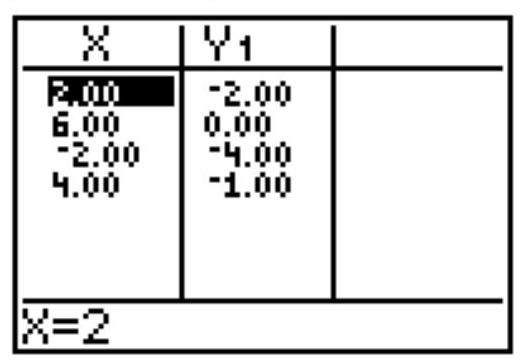
A)
B)
C)
D)
-The table of ordered pairs was generated by a graphing calculator with a table feature. Which equation corresponds to this table of values?

A)
B)
C)
D)

Unlock Deck
Unlock for access to all 347 flashcards in this deck.
Unlock Deck
k this deck
62
Solve the problem.
-Suppose that it has been determined that if 100 of a certain fish are introduced into a pond with certain environmental conditions, then in months, there will be fish in the pond. A portion of the graph of this equation is shown on the accompanying screen, along with the coordinates of a point on the line. How can this point be interpreted in the context of the model?
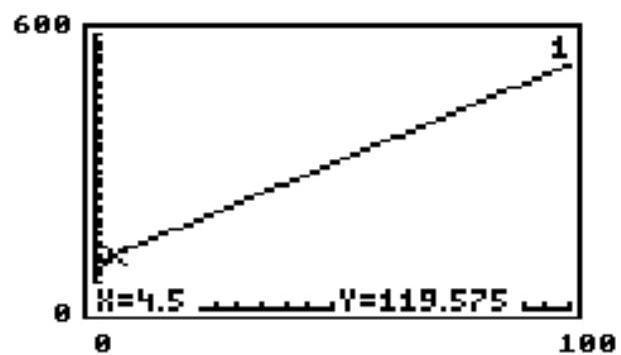
A) It means that there could be between 5 and 120 fish in the pond at a certain time
B) It means that in 119.6 months, there should be approximately 5 fish in the pond
C) It means that there will be fish in the pond in 4.5 months and in 119.6 months
D) It means that in 4.5 months, there should be approximately 120 fish in the pond
-Suppose that it has been determined that if 100 of a certain fish are introduced into a pond with certain environmental conditions, then in months, there will be fish in the pond. A portion of the graph of this equation is shown on the accompanying screen, along with the coordinates of a point on the line. How can this point be interpreted in the context of the model?

A) It means that there could be between 5 and 120 fish in the pond at a certain time
B) It means that in 119.6 months, there should be approximately 5 fish in the pond
C) It means that there will be fish in the pond in 4.5 months and in 119.6 months
D) It means that in 4.5 months, there should be approximately 120 fish in the pond

Unlock Deck
Unlock for access to all 347 flashcards in this deck.
Unlock Deck
k this deck
63
Solve the problem.
-Suppose that the speed at which an experienced person can paddle a canoe upstream is approximated by , where is the number of hours paddled and is the speed of the canoe in miles per hour. A portion of the graph of this equation is shown on the accompanying screen, along with the coordinates of a point on the line. How can this point be interpreted in the context of the model?
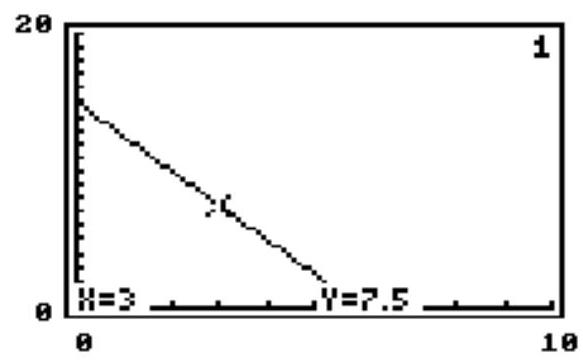
A) It means that after 7.5 hours of paddling, the canoe is traveling at a speed of 3 miles per hour.
B) It means that after 3 hours of paddling, the canoe is traveling at a speed of 7.5 miles per hour.
C) It means that an experienced person can paddle between 3 and 7.5 hours.
D) It means that the canoe can travel at a speed of between 3 and 7.5 miles per hour
-Suppose that the speed at which an experienced person can paddle a canoe upstream is approximated by , where is the number of hours paddled and is the speed of the canoe in miles per hour. A portion of the graph of this equation is shown on the accompanying screen, along with the coordinates of a point on the line. How can this point be interpreted in the context of the model?

A) It means that after 7.5 hours of paddling, the canoe is traveling at a speed of 3 miles per hour.
B) It means that after 3 hours of paddling, the canoe is traveling at a speed of 7.5 miles per hour.
C) It means that an experienced person can paddle between 3 and 7.5 hours.
D) It means that the canoe can travel at a speed of between 3 and 7.5 miles per hour

Unlock Deck
Unlock for access to all 347 flashcards in this deck.
Unlock Deck
k this deck
64
Solve the problem.
-The winning speeds for the Grayslake 250 race from 1980-1992 are approximated by the linear equation . In the model, corresponds to to 1981 , and so on. A portion of the graph of the equation is shown on the accompanying screen, along with the coordinates of a point on the line. How can this point be interpreted in the context of the model?
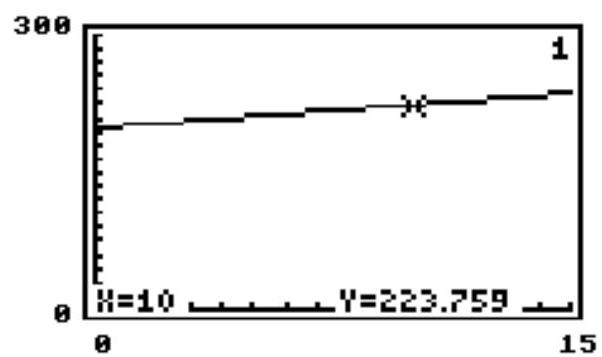
A) It means that in the year 1990, the winning speed was approximately 224 miles per hour.
B) It means that the winning speed in the year 1990 will be the same as in the year 2203.
C) It means that 10 years from now, the winning speed will be approximately 224 miles per hour.
D) It means that the winning speed was between 10 and 224 miles per hour.
-The winning speeds for the Grayslake 250 race from 1980-1992 are approximated by the linear equation . In the model, corresponds to to 1981 , and so on. A portion of the graph of the equation is shown on the accompanying screen, along with the coordinates of a point on the line. How can this point be interpreted in the context of the model?

A) It means that in the year 1990, the winning speed was approximately 224 miles per hour.
B) It means that the winning speed in the year 1990 will be the same as in the year 2203.
C) It means that 10 years from now, the winning speed will be approximately 224 miles per hour.
D) It means that the winning speed was between 10 and 224 miles per hour.

Unlock Deck
Unlock for access to all 347 flashcards in this deck.
Unlock Deck
k this deck
65
The point with coordinates is called the

Unlock Deck
Unlock for access to all 347 flashcards in this deck.
Unlock Deck
k this deck
66
For any value , the point lies on the _ axis.

Unlock Deck
Unlock for access to all 347 flashcards in this deck.
Unlock Deck
k this deck
67
To find the -intercept of a line we let and solve for__

Unlock Deck
Unlock for access to all 347 flashcards in this deck.
Unlock Deck
k this deck
68
The equation _ has a vertical line as its graph.

Unlock Deck
Unlock for access to all 347 flashcards in this deck.
Unlock Deck
k this deck
69
To graph a straight line, we must find a minimum of _ points.

Unlock Deck
Unlock for access to all 347 flashcards in this deck.
Unlock Deck
k this deck
70
Determine the quadrants in which the given point ( may lie when .
A) II or III
B) I or II
C) I or III
D) II or IV
A) II or III
B) I or II
C) I or III
D) II or IV

Unlock Deck
Unlock for access to all 347 flashcards in this deck.
Unlock Deck
k this deck
71
Determine the quadrants in which the given point may lie when .
A) II or IV
B) I or III
C) I or IV
D) I or II
A) II or IV
B) I or III
C) I or IV
D) I or II

Unlock Deck
Unlock for access to all 347 flashcards in this deck.
Unlock Deck
k this deck
72
Find the slope.
-
A) -5
B) 8
C) 5
D) 12
-
A) -5
B) 8
C) 5
D) 12

Unlock Deck
Unlock for access to all 347 flashcards in this deck.
Unlock Deck
k this deck
73
Find the slope.
-
A) -1
B) 1
C)
D)
-
A) -1
B) 1
C)
D)

Unlock Deck
Unlock for access to all 347 flashcards in this deck.
Unlock Deck
k this deck
74
Find the slope.
-
A)
B)
C) 0
D)
-
A)
B)
C) 0
D)

Unlock Deck
Unlock for access to all 347 flashcards in this deck.
Unlock Deck
k this deck
75
Find the slope.
-
A)
B)
C) Undefined
D) 0
-
A)
B)
C) Undefined
D) 0

Unlock Deck
Unlock for access to all 347 flashcards in this deck.
Unlock Deck
k this deck
76
Find the slope.
-
A)
B) Undefined
C) 0
D) 4
-
A)
B) Undefined
C) 0
D) 4

Unlock Deck
Unlock for access to all 347 flashcards in this deck.
Unlock Deck
k this deck
77
Find the slope.
-
A)
B)
C)
D)
-
A)
B)
C)
D)

Unlock Deck
Unlock for access to all 347 flashcards in this deck.
Unlock Deck
k this deck
78
Find the slope.
-
A) 0
B)
C) Undefined
D)
-
A) 0
B)
C) Undefined
D)

Unlock Deck
Unlock for access to all 347 flashcards in this deck.
Unlock Deck
k this deck
79
Find the slope.
-
A)
B) Undefined
C)
D) 0
-
A)
B) Undefined
C)
D) 0

Unlock Deck
Unlock for access to all 347 flashcards in this deck.
Unlock Deck
k this deck
80
Find the slope of the line through the given pair of points, if possible. Based on the slope, indicate whether the line through the points rises from left to right, falls from left to right, is horizontal, or is vertical.
- and
A) 7; rises
B) ; falls
C) ; rises
D) - 7; falls
- and
A) 7; rises
B) ; falls
C) ; rises
D) - 7; falls

Unlock Deck
Unlock for access to all 347 flashcards in this deck.
Unlock Deck
k this deck



